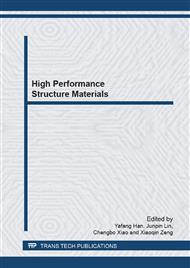[1]
R.W. Staehle, J.A. Gorman, Quantitative Assessment of Submodes of Stress Corrosion Cracking on the Secondary Side of Steam Generator Tubing in Pressurized Water Reactors.
DOI: 10.5006/1.3277522
Google Scholar
[2]
H. Coriou, et al., High Temperature Stress Corrosion Cracking of Inconel in Water, Third Metallurgical Symposium on Corrosion (Aqueous and Gaseous), 1959, North Holland Publishing Co., Amsterdam, published in 1960, pp.161-169.
Google Scholar
[3]
EPRI: K. Ahluwalia, Materials Reliability Program: Characterization of Cracks in a Control Rod Drive Mechanism (CRDM) Nozzel Base Metal and Weldment From Davis-Besse (MRP-193), 1013419, Final Report, June (2006).
Google Scholar
[4]
INCONEL Alloy 600, Publication Number SMC-027, Special Metals Corporation, 2002 (Sept. 02).
Google Scholar
[5]
INCONEL Alloy 690, Publication Number SMC-079, Special Metals Corporation, 2002 (Sept. 02).
Google Scholar
[6]
EPRI: K. Ahluwalia, C. King, Materials Reliability Program: Review of Stress Corrosion Cracking of Alloys 182 and 82 in PWR Primary Water Service (MRP-220), 1015427, technical update, October (2007).
Google Scholar
[7]
P. Efsing, B. Forssgren, R. Kilian Root cause failure analysis of defected J-groove welds in steam generator drainage nozzles", Proceedings of 12th International Conference on Environmental Degradation of Materials in Nuclear Power Systems – Water Reactors, TMS (2005).
Google Scholar
[8]
C. Amzallag, J. M. Boursier, C. Pages, C. Gimond, Stress corrosion life experience of 182 and 82 welds in French PWRs, Proceedings of Fontevraud V, September 2002, pp.69-79.
Google Scholar
[9]
R. Gérard, Ph. Daoust, Ph. Dombret, D. Couplet, Ch. Malékian, Situation of the Alloys 600 and 182 issues in Belgian nuclear power plants", Proceedings of the 2005 International PWSCC of Alloy 600 Conference and Exhibit Show, MRP-154, EPRI Report 1012089, (2005).
Google Scholar
[10]
P. Efsing, G. Embring, B. Forssgren, B. Kroes, R. Lundström, Failure analysis of the Ringhals Unit 3 EDM surfaces removed from the RPV outlet nozzle to safe end weld, Proceedings of Fontevraud VI, September 2006, pp.283-290.
Google Scholar
[11]
EPRI: R.S. Pathania, A.R. Mcilree and J. Hickling, overview of primary water cracking of alloys 182/82 in PWRs.
Google Scholar
[12]
J. V. Mullen, R. J. Parrington, Stress Corrosion of Alloy 600 Weld Metals in Primary Water, Paper F3, Proceeding: 1992 EPRI Workshop on PWSCC of Alloy 6000 in PWRs, EPRI TR-103345, December (1993).
Google Scholar
[13]
C. Amazllag, J. M. Boursier, C. Pages, C. Gimond, Stress Corrosion life assessment of 182 and 82 Weld Used in PWR components, Proceeding of the 10th Internal Conference on Environmental Degradation of Materials in Nuclear Power Systems- Water Reactors, NACE, Houston, Texas, (2002).
Google Scholar


